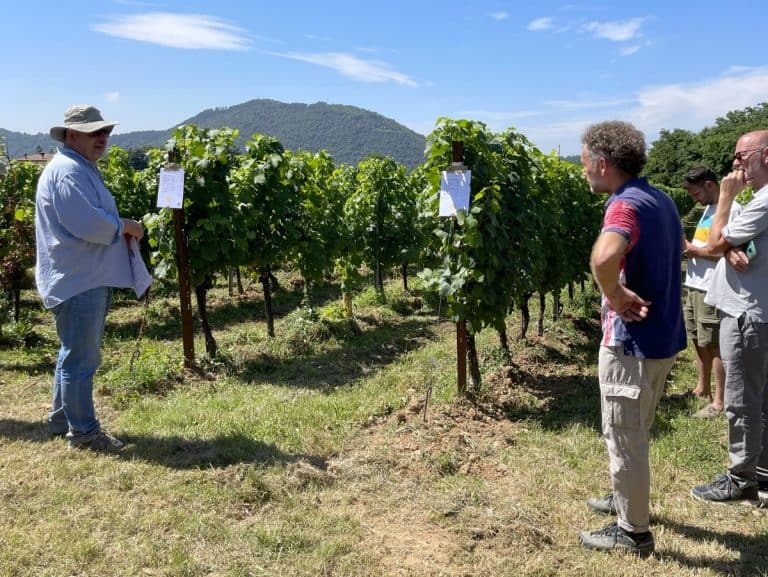The new-generation "M" rootstocks are capable of leading the vine to better performance and consequently fostering superior wine quality. After more than twenty years of experiments and micro-vinifications conducted in ten production areas from Piedmont to Sicily, the University of Milan has demonstrated that these rootstocks—developed starting in the 1980s through a genetic improvement program—offer several advantages to winemakers: vigour and production of the vine, technological, phenolic, and aromatic ripening of the grapes. These results stem from the work of Professors Attilio Scienza and Lucio Brancadoro of the Lombard university, in collaboration with the companies of Winegraft, an entity that brings together nine major Italian firms: Ferrari, Zonin, Banfi, Armani Albino, Cantina Due Palme, Claudio Quarta Vignaiolo, Bertani Domains, Nettuno Castellare, and Cantine Settesoli.
Twenty years of experimentation
"We have finally managed to demonstrate," explained Professor Scienza, who is also the scientific director of the advanced training course The Wine of the Future: New Skills for New Scenarios at the Gambero Rosso Academy, "that even in viticulture, as has long been recognised in other fields of tree crops, the rootstock is also a valuable vehicle for qualitative improvement in production."
The lengthy timeline to achieve these results has an explanation: "Objectively," notes Scienza, "it is more challenging in viticulture to carry out in-depth investigations on the effect of rootstocks on grape quality due to the complex interactions that occur between the rootstock, the cultivation environment, and the various grape varieties."

Quality advantages
The results of this long experimental work, as declared by Professor Brancadoro, now offer a clearer picture of the direct impact of rootstock selection on the productive and qualitative performance of the vine and the grape, with reference to wine quality.
"In the various combinations of grafts in different trial fields comparing the M rootstocks and other traditional rootstocks among those most commonly used in Italy, not only has the extreme adaptability of the M rootstocks to different environments emerged, but also how, through the regulation of the vine's adaptive responses to varying environmental conditions, the M rootstocks are a significant driver of qualitative outcomes."
Among the advantages highlighted by the academic: a more efficient response to increasingly extreme abiotic stress due to climate change, a more favourable ripening process for the grapes, which is a "prerequisite for superior oenological results."
Promising results for sparkling wines
In particular, for cabernet sauvignon grafted onto M-type rootstocks, better productive outcomes were observed, balanced by good vigour and sugar levels above the average. A similar parameter was found in chardonnay, in comparison fields in Franciacorta and the Trentodoc area. This was accompanied by higher levels of total acidity (particularly malic acid) and lower pH, a critical element for quality sparkling wines.
From a sensory perspective, wines from chardonnay grafted with M rootstocks in Franciacorta exhibited higher acidity levels and a complex aromatic profile that accentuates tropical fruit notes: wines that are more intense on the nose and, on the palate, feature greater acidity, sapidity, structure, and persistence.

Experiments on red grapevines
As noted in a statement by Winegraft, the M rootstocks influence the accumulation of polyphenols during ripening. Field trials on various red grape varieties (nero d'Avola, cabernet sauvignon, and sangiovese) revealed higher levels of total polyphenols in the grapes, greater tonal richness of colour substances accompanied by higher accumulation and concentration, particularly of the non-bleaching anthocyanin fraction, which facilitates better colour persistence during aging.
Finally, the M rootstocks affect the aromatic composition of the grapes: by influencing a differentiated response to environmental conditions, they also directly impact the secondary metabolism of the vine.

A shift in perspective
Marcello Lunelli, president of Winegraft, speaks of a viticultural paradigm shift due to the results of this research:
"We must reconsider the approach we have always had towards rootstocks (propagated and distributed exclusively by Vivai cooperativi Rauscedo; ed.). The scientific evidence of the importance of M rootstocks in determining wine quality," concludes Lunelli, "confirms the need for a careful selection of grafting combinations that take into account the variety and environmental characteristics but also consider the oenological objectives to be pursued."


 Brigitte Bardot’s final rosé: the wine that marks the end of an icon
Brigitte Bardot’s final rosé: the wine that marks the end of an icon What you need to know about Italy's new decree on dealcoholised wine
What you need to know about Italy's new decree on dealcoholised wine Why Arillo in Terrabianca's organic approach is paying off
Why Arillo in Terrabianca's organic approach is paying off What do sommeliers drink at Christmas?
What do sommeliers drink at Christmas?





